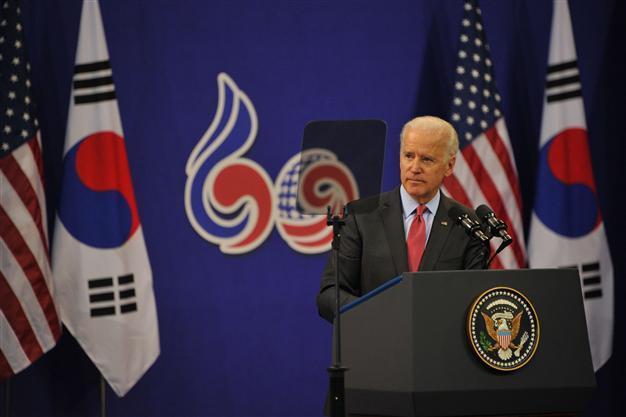Biden says US 'pivot' to Asia cannot be derailed
SEOUL

US Vice President Joe Biden delivers remarks on the US-South Korea partnership and US policy in the Asia-Pacific region at Yonsei University in Seoul on December 6, 2013. AFP Photo
US Vice President Joe Biden said Friday there should be no doubt about US commitment to its strategic shift to Asia as he wound up a regional tour dominated by security concerns.
In talks with South Korean President Park Geun-Hye and later in a speech at Seoul's Yonsei University, Biden reiterated US opposition to a new Chinese air defence identification zone that has fulled regional tensions -- especially between Beijing and Japan.
At the same time, he underlined the regional -- and global -- unity in the face of the "clear and present danger" of North Korea's nuclear weapons programme.
"Let there be no doubt, the United States is committed to do what it takes to defend our allies and ourselves against North Korean aggression. Period," he said in his speech.
The threat posed by Pyongyang was underlined by the publication Thursday of new satellite images that appeared to show increased activity at North Korea's main nuclear site, in line with the regime's vows to expand its weapons programme.
In his talks with Park, Biden stressed there would be no change to President Barack Obama's new security strategy that emphasises a shift, or "pivot", towards the Asia region in recognition of China's growing military power.
"I want to make one thing absolutely clear: President Obama's decision to rebalance to the Pacific basin is not in question," Biden said as the two leaders sat down for talks.
"The United States never says anything it does not do. It's never been a good bet to bet against America... and America will continue to place its bet on South Korea," he added.
Seoul was Biden's last stop on a three-country Asia tour that has already taken him to Japan and China.
President Park pressed Biden Friday on China's new "air defence identification zone" (ADIZ) which, as well as inflaming Beijing's territorial disputes with Japan, also overlaps South Korea's own ADIZ.
Seoul has threatened to announce the expansion of its ADIZ in retaliation -- a move Biden was seeking to discourage as Washington seeks to calm what is already a dangerously volatile mood in the region.
Acknowledging the "considerable apprehension" triggered by China's declaration, Biden stressed that Washington did not recognise the new zone.
However, as on his visits in Tokyo and Beijing, he stopped short of demanding that China rescind its decision.
Tensions in the region are at their highest in years, with China and Japan squaring off over a chain of uninhabited islands in a feud that has some observers warning of the danger of an armed confrontation.
While reassuring South Korea of US support, Biden's university speech clearly referenced Washington's desire for Seoul to pursue better relations with Tokyo.
As the battle for influence in Asia between China and the United States heats up, Washington wants its two main military allies in the region on board and undivided.
But South Korea and Japan are going through one of their regular diplomatic freezes, with Park refusing to even talk to Prime Minister Shinzo Abe until Tokyo apologises for a host of historical grievances related to Japan's 1910-45 rule over the Korean peninsula.
"The entire region will be more stable and more secure if the leading democracies -- Japan, South Korea and the United States -- are able to improve their relations and cooperation with one another," he said.
On Saturday, Biden is scheduled to tour the demilitarised zone that has separated South and North Korea since the end of the 1950-53 Korean War.
His visit comes just days after South Korea's intelligence agency reported a major purge in the North Korean leadership, with the apparent ousting of leader Kim Jong-Un's uncle and political mentor Jang Song-Thaek.
The report triggered fevered speculation about the stability of the regime in Pyongyang at a time when North Korea is pressing ahead on all fronts with its nuclear weapons programme.
China has been pushing hard for Washington and Seoul to resume six-party talks on the North's nuclear ambitions, but Biden insisted Pyongyang must first demonstrate tangible commitment to denuclearisation.
"The international community will not accept or tolerate a nuclear-armed North Korea," the vice president said.
